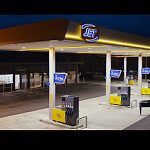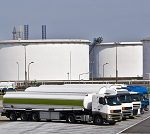
OnlineFuels, the leader in digital transformation solutions for the refined fuels market has been acquired by DTN, a leading data, analytics and technology company. With the addition of the OnlineFuels innovative online trading platform, DTN is now the leading provider of solutions that bring visibility where it hasn’t existed before. In the near future, refined fuels customers will be able to access their operational data in one seamless platform along with the ability to support end-to-end buying and selling transactions.
James Stairmand, founder of OnlineFuels commented: “Proud to announce that after nearly 6 years of founding OnlineFuels, we have been acquired by DTN. A massive team effort to get this over the line. I’m excited for the next chapter and looking forward to joining the DTN team.
“I started the business with a view of one day exiting, so I’m delighted with the outcome. Happy I took the risk and went on my own adventure!”
The industry-leading solution solves a complex issue many commodity traders around the world face –how to complete transactions using real-time data to drive better profitability while also mitigating risk. Many transactions today are logged in separate programs or documents, leading to increased risks of human error. The end-to-end online marketplace –once added to the DTN suite of solutions –will alleviate that risk and allow customers to make confident decisions that impact their bottom line.
“Our customers look to DTN to not only make sense of their data and deliver operational intelligence, but also to do so through innovative solutions that support complex decisions and give their business a competitive advantage,” said Marc Chesover, president of DTN. “Adding the OnlineFuels team and online trading platform to DTN solutions strengthens our ability to serve our customers around the world and solve a long-standing challenge of digitising their buying and selling transactions.”
Once integrated, DTN will be able to seamlessly connect the buyers and sellers of commodities worldwide through a robust online marketplace. In the future, the company plans to leverage the OnlineFuels technology and offer it to additional markets and industries.
“By joining the DTN team, we see a great opportunity to continue investing in our ability to support digital transformation within the refined fuels industry in Europe and, later, North America,” said James Stairmand. “Through the integration, we will match our solution with existing and future DTN platforms to give our customers the tools needed to confidently make decisions, mitigate risks and turn their operations into a competitive advantage.”
The combined offering, once available, will provide a cohesive view of operations and the technology necessary to facilitate end-to-end transactions. This acquisition furthers the DTN mission of empowering customers with intelligent and actionable insights that result in confident decisions and a competitive advantage.

JET, one of the UK’s leading fuel brands, is resurrecting its critically-acclaimed TV campaign – Keep on Moving.
Originally launched in September 2020 and shown exclusively in the North East and Midlands, the second airing, that coincides with the nation opening up again, will target new territories including: Yorkshire, East of England and the North West. The ad will also feature nationally on SkySports cricket: England vs New Zealand Test Matches.
Featuring a man ‘driving’ through the countryside on a grand piano while singing Joe Jackson’s iconic 80’s hit ‘Steppin’ Out’ – the memorable TV spot was praised for its ‘refreshingly absurd twist on the car commercial’ and for making ‘a visit to a gas station look epic’.
Commenting on the decision to re-run the campaign Áine Corkery, manager, brand, Phillips 66 Limited says: “The campaign landed so strongly with both our JET dealers and consumers first time around that making the decision to bring it back this year was an easy one. It’s an ad that celebrates the joy of driving and the open road and it captures our ‘driver-first’ ethos perfectly.”
The ‘Keep on Moving’ campaign will launch on Thursday 27th May on SKY and Virgin Media and will run until 4th July.

UKPIA welcomes the recent UK Government announcement of £166 million towards green technology projects. The association is particularly pleased to see the investment in hydrogen as a primary decarbonisation technology for manufacturing processes.
As part of this announcement, it has been confirmed Essar Oil (UK) Limited will receive a grant of over £7 million towards the upgrade of a distillation unit with a new, net zero ready furnace at Stanlow. Phillips 66 Limited will also receive a grant of over £500,000 towards research into fuel switching in the Humber refinery’s gas fired heaters, to see how greater use could be made of hydrogen in that process.
Find out more about Essar Oil UK’s project here.
Whilst hydrogen is already an important part of the refining process, use of low carbon hydrogen would result in significant reductions of emissions at the refinery and, therefore, across the lifecycle of all of its products.
UKPIA eagerly awaits the publication of the UK Government’s Hydrogen Strategy to help industry further to align long-term investment decisions with a low carbon future.
UKPIA director-general, Stephen Marcos Jones, comments:

A new project that forms part of Essar’s plans to decarbonise the Stanlow Refinery in North West England has secured a £7.2m grant from the Industrial Energy Transformation Fund.
The funding has been made available through the Department for Business, Energy & Industrial Strategy (BEIS) and will be invested in a project to install a new furnace in the crude distillation unit at Stanlow that will be able to run on a 100% hydrogen fuel source. It will be the UK’s first refinery-based furnace able to be fuelled entirely by hydrogen.
Once completed and operational, the net zero ready furnace will reduce Stanlow’s CO2 emissions by 11% per year and deliver immediate energy efficiency improvements. The furnace will use hydrogen produced by the HyNet North West project at Stanlow, with the first stage of the initiative set to come on stream in 2025.
The new furnace is another element in Essar’s transition to becoming a ‘Low Carbon Energy Provider’ of the future. This will also include the construction of two blue hydrogen production hubs at Stanlow under the HyNet project, which will attract £750 million in total investment and support a hydrogen economy across North West England and North Wales. HyNet’s hydrogen and carbon capture and storage (CCS) chain represents a major step forward for low carbon energy technology and innovation in the UK.
Together with HyNet, Essar has also announced plans to create a new facility to convert non[1]recyclable household waste into sustainable aviation fuel (SAF) for use by airlines operating at UK airports. The £600m project involves Essar Oil UK, Fulcrum BioEnergy and Essar’s subsidiary company Stanlow Terminals Limited and will convert several hundred thousand tonnes of pre-processed waste, otherwise destined for incineration or landfill, into approximately 100 million litres of low carbon SAF annually.
Essar chief operating officer Jon Barden commented: “This year has been about beginning to execute the strategy we’ve put in place to decarbonise Stanlow and position the site as a provider of sustainable fuels for the future. The investment into CD4, alongside the HyNet and Fulcrum projects, demonstrates our commitment to developing low carbon operations, with the ambition of becoming a net zero site by 2040.
“The funding from BEIS is an endorsement of the steps we’re taking, as well as a signal of the Government’s intent to transform the North West into a clean energy hub supporting jobs and economic growth for years to come.”

The key speakers and industry topics have been revealed by UKIFDA for the two-day Future Fuels conference during UKIFDA EXPO 2021 on 7-8 July which will include a ministerial address by Lord Callanan, minister for climate change & corporate responsibility.
“We are very pleased with the plans for this year’s EXPO and what will be our first ever virtual event and Future Fuels conference – and delighted to reveal the line-up of speakers and talks for the two days,” says Ken Cronin, UKIFDA chief executive.
“At its core, this year’s exhibition is focused on Future Fuels – the incredible investment our industry is making in renewable liquid fuels and the central issues associated with it, including the role of next generation renewable fuels in helping both the UK and Irish Governments achieve net zero targets and the transition to renewable liquid fuels.”
Across the two days of the conference there will be a number of breaks to allow delegates to visit exhibitors’ booths and also for exhibitors to make announcements or invite people to specific presentations.
The programmes for the two days are sponsored by Aon and Cobo Tankers and Services Ltd, who will each sponsor a day together with EXPO headline sponsor Phillips 66 Ltd.
Ken Cronin will launch UKIFDA EXPO 2021 with an overview of how the two days will run, to make it as easy as possible for exhibitors, visitors, members, and delegates, to make the most of what’s on offer virtually this year.
UKIFDA membership and events manager, Dawn Shakespeare, comments: “We will kick off day one with sponsors Aon who are providing our keynote speech to get everyone geared up for a great two days of knowledge sharing, networking, and business deals.
“James Spencer, managing director of Portland, will then present an analysis of market trends that includes key trends of the past 2 years and highlights for the future, followed by an EU-focussed roundtable discussion on key events in the EU that will impact our industry over the next decade. Participating in these discussions are Kevin McPartlin of Fuels for Ireland, Nick Hayes of UKIFDA, and Thierry Javit of the European Confederation of Fuel Distributors.
“There will also be a policy roundtable with the Department for Transport, BEIS and the treasury on the key themes of the current policy landscape covering heat, transport and taxation.
“In the afternoon of day one a discussion on fuel poverty will take place, focusing on the goals for fuel poverty and how our industry help. This will feature representatives from the UK Government’s Committee on Fuel Poverty, National Energy Action, The Home Group, and the National Housing Federation.
“Towards the end of the day, representatives of the trade associations and countries will be setting the scene for future fuels, what needs to be done and the new norm. Taking part will be Ken Cronin of UKIFDA, Paul Rose of OFTEC and David Blevings of NIOILS.
“The day will end with awards being handed out by UKIFDA president Janet Kettlewell, for depot of the year, driver of the year, green award, and an award for innovation.”
The format for UKIFDA EXPO 2021 is similar to the programme for previous EXPOs that have taken place during the past 40 years – only this time everything has been designed with the virtual experience in mind.
“Day two will be opened with an address by Lord Callanan, who has ministerial oversight of our sector, followed by Simon Holt of headline sponsors Phillips 66 Ltd and a presentation from Fernando Gomis and Joby Clark of day two sponsors Cobo Tankers and Services Ltd,” adds Dawn Shakespeare.
“A discussion on the key trends in the production of biofuels and next generation renewable fuels will be a highlight of the second day, with analytical contributions from representatives of Argus Media, Climate Change Committee and key suppliers Neste, Greenergy, Prax/Harvest, Phillips 66 Ltd and Argent Energy.
“Day two will also feature an important and insightful roundtable Q&A on the how the industry trials of HVO renewable liquid fuel are progressing in UK homes.
UKIFDA CEO Ken Cronin adds: “It’s a busy couple of days, to say the least – and we genuinely cannot wait to engage with exhibitors, members, visitors, and delegates during the exhibition and conference.
“We have all worked extremely hard on the planning of this year’s virtual event and have put together a fantastic line-up of key speakers together with relevant, thought-provoking topics in a range of formats that include presentations, discussions, Q&As and informal exchanges.
“The programmes for the two days will no doubt be fine-tuned between now and 7/8 July but we wanted to share our plans to-date and to encourage as many companies and individuals as possible to join us online and make our first virtual UKIFDA EXPO a huge success. As time gets closer to the event we will be using the conference app more and more to communicate information.”
To register as a delegate please click here.
Being a virtual conference we are able to take bookings to be an exhibitor much closer to the day so it is not too late! For further information please contact Dawn Shakespeare via email.
The Leicestershire-based independent and family-owned distributor, now in its 60th year, has recently been approved for two prestigious accreditations following a project that was first implemented in late 2020. With the company being recognised for excellence in administration systems, having been assessed and approved to ISO 9001 standard, as well as being awarded the Fleet Operators Registration Scheme accreditation we spoke with managing director, David Prince.

Diversification is a constant theme of our industry currently as those involved in all aspects of fuel production and distribution find ways to keep pace with the evolving nature of fuel demand. Here we speak with Damian Fusco, owner of Bangor Fuels in Northern Ireland, to learn how the business has grown and diversified since he took the bold step to take it on 20 years ago.
It began with belief
Now a multi-faceted business, Bangor Fuels is where it all started, and where Damian clearly still feels the greatest sense of pride. Damian takes us back:
“Most local people will recall Rayker Fuels, a coal business. Well, I managed them from 1994 and, after a few years there, I saw an opportunity to buy the business.”
It turns out that ‘buying the business’ was a different arrangement to the way it would usually be understood. Damian didn’t have the ready cash to invest in the way he wanted to but he did have sufficient belief in the future of the business to propose a bolder arrangement.
“I offered the owners the opportunity to sell to me and for me to pay them back out of annual profits. Accepted, I took over in 2001, and so it began. I had just backed myself to make a success of it and be able to make a living as well as paying for the business!”
A lot of hard work followed over the next 12 months leading to two major developments. January 2002 saw the purchase of a first oil tanker and then the business moved to Gransha Stores later that same year.
The years that followed were about keeping his head down and building a reputation.
“There is no real secret to those years,” Damian admitted. “It was largely down to hard work, making sure that our service was second to none, and holding a keen price. I didn’t have a grand vision of where the business was going, and none at all of me being where I am now.”
An unspoken testimony to the personal graft that Damian has invested over the years is that his hands are black. They are, in fact, ‘permanently black’ due to the number of times he lay under lorries and vehicles until the early hours of the morning putting in new clutches or doing what was needed to keep the wheels moving.
“If it needed done I just did it myself, whatever it was.” A commitment well understood by other self-made businesses but, as Damian is first to acknowledge, family and friends were also a ‘massive support’.
Constant investment and growth
As the company has grown it has continually looked for ways to improve and diversify through investment. By 2007, a new home was needed, and 5 Balloo Way was purchased, which is where Bangor Fuels remains now.
With the rapid growth experienced under his ownership, we asked Damian to explain the principles the business was so successfully built on and he answers without hesitation:
“Quicker, cheaper and more reliable. That’s what I set out to be and how we’ve succeeded. Furthermore, we are now renowned for our respected ‘one price promise’ – irrespective of distance.”
This approach proved to be a successful growth strategy, very popular with customers and, having started in North Down and Ards, BT1 to BT9 and BT16 were soon incorporated, and in time, greater Belfast and beyond as Damian confirms:
“We now go to Antrim and Larne, as demand has pushed expansion.”
Diversification came naturally
Another driving force is the desire to add value to the local area and employ people who are willing and keen to work. Constantly regarding challenges as opportunities has led to natural diversification and the business became businesses, with Damian now proud owner of not only Bangor Fuels, but also Fusco Vehicle Sales, Maypole Garden Services, Maypole Construction Design & Build, Maypole Lawnmowers and, most recently, Wolseys Bar & Restaurant. All are now prosperous, well-known local brands important to the local area with Bangor Fuels employing 35 people and 85 employed in total across the companies.
When asked how these other businesses came about Damian explains:
“What do you do with drivers in the summer when orders are down? How do you keep seasonal factors at bay and keep paying people? Well, we put an ad in the Spectator and opened a gardening company!”
And this ability to create an opportunity from a challenge wasn’t a one-off.
“What happens when you build a fleet of vehicles that need replaced, and need repaired, and lawnmowers that need updated and fixed. Well, you get the drift.”
At each challenge the business has evolved and grown, and we wonder what other developments may be coming.
“The challenges of the future are not just operational, such as the fact that it is now much harder to get qualified tanker drivers, but also how far to expand and develop the business.” Damian replies thoughtfully.
“I’m not necessarily going to grow province-wide, but the business is expanding organically as new customers continue to come to us. And I’m still very passionate about Bangor. All my businesses are in Bangor and I try to support the local community where possible. It would have been easier and less rick to tick along as Bangor Fuels, but I’m keen to invest locally, which is why I’ve expanded into other local areas”.
It seems that Damian is not a man to rest on his laurels and our suspicions are confirmed when we ask about his out of work passions. Damian thinks for a while then admits: “When I’m not working, I’m in work”.
Given this passion for the business and the area we have no doubt there will be more developments to hear from Bangor Fuels soon and we will look forward to sharing them.
The hands may be black, but the future certainly doesn’t appear to be so.

Covid-19 and plummeting oil prices are two of the most substantial challenges that the fuel oil distribution sector has faced in the past 12 months. But whilst these were very much in the spotlight, existing challenges continued to present barriers – one of the biggest being driver shortages across the UK and Ireland.
During recent conversations, several distributors have told Fuel Oil News that a shortage in drivers is one of the biggest challenges facing their businesses currently. With an increased workload for many distributors in an unseasonably cold spring, some distributors have had to rely on drivers hired from agencies, although this can sometimes be more of a hindrance than a help.
Carrie Marsh, managing director, Marsh Fuels told us: “We don’t use agency drivers any more after our own experience was that while the ones that came to us had the right ‘piece of paper’ to do the job, they had never put delivery by oil tanker into practise, let alone safely negotiate tight driveways at customer properties. We paid out more in repair bills…”
It is not just distributors that are struggling to fill the skills gap, however. A latest report from Logistics UK highlighted that almost one in ten logistics businesses (9.8%) say the recruitment of drivers is an ‘extreme barrier’ to the recovery of their business. Logistics UK is urging the government to take immediate action to unlock access to these careers for new recruits to the sector, in order to support the recovery of UK PLC.
The pandemic has not helped matters, as Alex Veitch, general manager for public policy at Logistics UK outlines: “Our report shows that 29% of logistics businesses anticipate that they will be unable to fill vacancies for HGV drivers this year; a further 14.5% expect long delays before filling a role. With the logistics industry in urgent need of these workers, Logistics UK is urging the government to provide interest free loans or grants to train or reskill potential employees and help recruit them into the logistics industry. The business group is also urging the Driver and Vehicle Standards Agency (DVSA) to maintain its fast-track programme to catch-up on at least 30,000 driving tests that were postponed due to Covid-19 between March and December 2020; this has left thousands of potential HGV drivers waiting in the wings when the UK needs them most to support every facet of UK PLC.”
Are you struggling with driver shortages? Do you think support from government will help to close this gap? Let us know stephanie@fueloilnews.co.uk

Essar Oil (UK) Limited (EOUK), which owns and operates the Stanlow Refinery, today announced that it has closed new financial arrangements of over US$850 million. This has allowed EOUK to replace its former credit facility as well as access additional capital, thereby strengthening its financial position.
The funding is made up of liquidity from a diversified range of sources, including bilateral arrangements with many of its key customers on enhanced payment terms and other long-term financings, linked primarily to crude supply.
With these financial arrangements now in place, EOUK has more low-cost liquidity to meet its upcoming requirements and can continue to focus its energies on its transition to become a “Low Carbon Energy Provider” of the future. EOUK is already working on delivering two blue hydrogen production hubs at Stanlow, which will attract £750 million in total investment.
Find out more about Essar’s transition to becoming a ‘Low Carbon Energy Provider’ of the future here.
Follow-on capacity growth is planned to work towards the Government’s new target of 5GW of low carbon hydrogen for power, transport, industry and homes. Stanlow is committed to reaching 80% of the Government-set targets. In addition, EOUK remains committed to delivering the necessary operational cost reductions at the refinery over the course of the coming year in order to help secure its long-term future and to ensure it remains competitive in its traditional refining business.
EOUK has also recently completed a review and update of its corporate governance and its board has adopted the recommendations arising out of that review process, which included independent input from Ashurst LLP. As a result of that process, the board has committed to appointing two independent non-executive directors to the board.
Commenting on the recent developments, chairman Prashant Ruia said: “Securing this financing demonstrates the confidence all our stakeholders have in our long-term vision for Stanlow.
“We believe this confidence will be further bolstered by the updates we have made to our corporate governance, which includes a commitment to appoint two new independent non-executive directors to our board. These appointments will further enhance our overall governance and risk assessment processes, as well as providing insights and strategic inputs to the business as it continues its transition to low carbon operations.
“With a strong economic recovery driven by the UK Government’s roadmap out of the pandemic, I feel that our business has moved into a positive and progressive phase for the benefit of all of our stakeholders and employees. We look forward to furthering our investments in exciting new technologies, securing high-tech jobs and the Stanlow’s future at the heart of the UK’s green revolution.”

The second week in May saw the largest pipeline in the United States shut down for five days after the operator of Colonial Pipeline was hit by a ransomware attack by Russian criminal group, DarkSide, as named by the FBI, forcing it to shut down all pipeline operations.
The pipeline carries gasoline and other fuel between Texas and Northeastern states, delivering, according to Colonial Pipeline, around 45% of the fuel used on the East Coast. Reported as the worst assault to date against US critical infrastructure, the attack underscores serious vulnerabilities within US infrastructure.
Why do oil prices vary?
Oil prices vary from day to day, but when an unexpected event occurs that causes disruption in the supply chain, drastic variations can be the result. We’ve mostly recently witnessed this with the Covid-19 outbreak, where oil prices plummeted because of decreasing demand, only to become more stable when supply was reduced.
With demand returning to normal, as the majority of the world comes out of lockdown, the closure of the pipeline has the reverse effect, resulting in the oil price to increase.
Mike Johnson, general manager, Portland Fuel said:
“The cyberattack saw WTI oil futures (North America’s primary crude benchmark) spike to $65.50/bbl, close to a two-month high, after the pipeline was shut down to contain the impact of the attack, causing concerns over security of supply.
“The majority of US refining capacity is located on the Gulf Coast, meaning the East Coast is heavily reliant on transportation via the pipeline, which carries 2.5-3mbpd of refined product from Houston to New York (around 45% of the East Coast’s refined product supply). Any prolonged period of downtime would therefore cause significant issues around the availability of refined product in the region – associated concerns saw domestic gasoline prices increase by around 2% as a result.
“As a domestic distribution network of refined product, opposed to crude, the wider impact on global oil prices was lessened, for example Brent crude prices increased slightly by c. $0.75/bbl to a high of $69.00/bbl on Friday before dropping back to trade around $68.00/bbl by close of business. However, the attack does highlight the relationship between oil prices and disruption in supply.”
Ian Moore, OMJ also comments on the effects of the supply ‘dislocation’:
“The outage of the Colonial Pipeline linking the US oil production and refinery region in the US Gulf Coast with the US demand region of the US East Coast is a supply dislocation rather than supply outage. This is because the oil which is normally pumped into the pipeline is still being produced and shipped and stored elsewhere. For example, the major producers in the US Gulf Coast are reported as having hired tankers to store oil they cannot pump. In addition, traders can ship additional product from Europe to the US East Coast. This is not a new phenomenon and shipping gasoline from Europe to the US is well established.
“During the 1970s-1990s, the oil market was largely focused on Middle East tensions. However, with the rise in US shale production, Middle East supply is of lesser importance. In addition, the move to a low carbon economy will further reduce the impact of oil outages.”
Commenting further on the relationship between oil prices and supply disruption, Portland Analytics highlighted that this was recently demonstrated during the week-long blockage of the Suez Canal by the MV Ever Given container ship, which saw Brent crude prices rise c. $5.00/bbl across the week of the grounding. Further back, geopolitical instability around the Strait of Hormuz, a key Middle Eastern oil shipping route, saw a prolonged period of volatile crude prices in the Summer of 2019 after the seizure of UK and Iranian oil tankers in the region.
In short, disruption in global crude/refined product transportation can affect oil prices due to the impact on the balance of supply and demand; if supply is limited and cannot meet demand as a result, prices generally rise. Although both crude indexes swiftly returned to their previous levels after it became evident the outage would not be sustained, the attack represents a short-lived example of the impact a lapse in security of supply can have on oil markets.
Looking forward, Ian comments on the potential future effects on oil prices:
“The most worrying geopolitical event might not be the occasional pipeline attack caused by a bomb blast or computer virus but rather a conflict in the South China Sea between the US and China over Taiwan or some other nation in the region which depends on the US for its security.”











